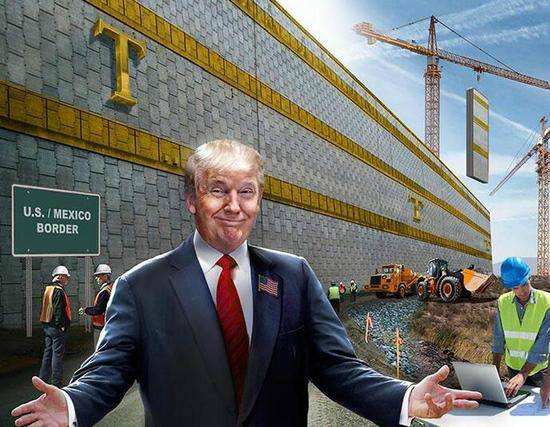United States
美国
Trade with Mexico: Playing Chicken
美墨交易:威胁
Farmers and Texans would lose most from barriers to trade with Mexico.
农民和德州人将因墨西哥贸易障碍损失惨重
MEXICO sells America more goods than America sells Mexico, and it enrages President Donald Trump.
墨西哥出售给美国的产品比美国卖给墨西哥的多,这一点让特朗普总统大为恼火。
In 2015 the difference was $58 billion (0.3% of GDP).
2015年这一差值为580亿美元(占美国GDP的0.3%)。

That is enough, thinks Mr Trump, to justify rewriting the North American Free-Trade Agreement (NAFTA), which allows goods to flow across the Rio Grande free of tariffs.
这个数据在特朗普看来,已足以证明修改北美自由贸易协定(NAFTA)的合理性,该协定对穿越格兰德河的货物实行零关税。
Yet the trade deficit masks bigger figures: America sends almost $240bn in goods to Mexico every year.
不过贸易逆差背后隐藏着更大的数字:美国每年销往墨西哥的货物价值大概为2400亿美元。
Were NAFTA to disappear in a renegotiation-gone-wrong, many Americans would pay a price—and not just as consumers faced with dearer avocados.
假如北美自由贸易协定再次谈判出现问题而失效,很多美国人将为此付出代价——这不仅仅是消费者要承受更贵的牛油果那么简单。
Which American producers would suffer?
那么作为美国厂商,谁将首当其冲呢?
Suppose, optimistically, that each side followed World Trade Organisation (WTO) rules.
乐观的设想是,双边均遵守世贸协定。
Then, tariffs would revert to so-called “most favoured nation” rates. (That might sound vaguely friendly, but it simply means neither side can offer a different deal from what it gives to any other WTO member.)
那么关税将恢复成所谓的最惠国税率(听起来可能有种含蓄的亲切感,但简单来说就是任何一方都不能提供给对方不同于其他WTO成员的待遇)。
By matching these tariffs to trade flows for about 5,000 goods, The Economist has estimated which states’ exporters would be worst-affected by the levies.
通过将关税与大约5000种产品想对应,经济学人杂志对哪个州的出口商将受到征税的最严重影响进行了估算。
Farm states face the highest charges.
农业州面临着最高的费用。
Whacking tariffs on malt, potatoes and dairy products would cause Idaho’s exports to Mexico to incur an average levy of nearly 15%.
麦芽、马铃薯及乳制品高昂的关税将使爱达荷州对墨西哥的出口产品的平均税率高达15%。
Iowa and Nebraska would pay on average 12.5% for the privilege of sending goods over Mr Trump’s wall.
爱荷华州及内布拉斯加州也将支付平均12.5%的税才有权穿越“特朗普墙”。
Some products would be particularly badly hit.
部分产品将尤其受到重创。
In 2015 Iowa’s farmers shipped $132m of high-fructose corn syrup to Mexico.
2015年爱荷华州的农民运送了价值13200万美元的高果糖玉米糖浆到墨西哥。
Without NAFTA, Mexico would slap a tooth-aching 100% tariff on the stuff.
如果没有北美自由贸易协定,墨西哥将对此征收100%的关税。
Little wonder that the farm lobby tends vocally to support free trade.
农业团体发声支援自由贸易不足为奇。
Yet farm states are lucky to have plenty of customers elsewhere.
但幸运的是农业州在别处也有大量的消费者。
Idaho’s exports to Mexico are worth less than half a percent of its GDP.
爱达荷州对墨西哥的出口不到其GDP的0.5%。
Other state economies are more tangled up with Mexico’s.
其他州的经济却和墨西哥紧密相关。
These places should worry about NAFTA’s fate despite facing low average tariffs.
尽管平均关税不高,但这些州更应该担忧北美自由贸易协定的命运。
Among this group, Texas stands out.
在这个组合里,德克萨斯州首当其冲。
It faces an average tariff of only 3%, but its exports to Mexico are worth nearly 6% of its GDP (compared with 1.3% nationally).
尽管其平均关税仅有3%,但对墨西哥出口占其GDP接近6%(全美为1.3%)。
As in Iowa, farmers would suffer.
同爱荷华州一样,农场主会蒙受损失。
Texan cuts of Gallus domesticus—otherwise known as chicken—would incur the largest tariff bill, $174m, of any single product category in the country.
德州出口家禽(也就是鸡类)的减少,会造成被征收全国各类货品中最高昂的关税,高达1740万美元。
In total, as a percentage of GDP, Texas would pay more than any other state.
支出所占的GDP比例比其他州都要多。
Michigan also fits this category.
密歇根州同样属于这一范畴。
Its exports of cars and parts—many of which end up back in America—would attract tariffs averaging only about 5%.
其汽车及零部件出口将被征收平均大约5%的关税,
But with such shipments totalling $4.1bn, the bill would be painfully large.
但如此大的运输量将使关税支出达到42亿美元,这是让人难以承受的高昂费用。
All this gives Mexico some leverage.
这给墨西哥带来了一些优势。
But Mr Trump has a stronger hand, because Mexican firms depend more on American consumers than vice versa.
不过特朗普更为强势,因为相较美国企业来说,墨西哥企业更为依赖美国消费者。
Part of the problem may be that rural America is already in the bag for the Republicans.
问题在于,美国农业州已经是共和党的囊中之物。
Of the 25 states which would pay most in tariffs, as a percentage of their GDP, only four voted for Hillary Clinton in November.
即将承担关税占GDP比例最高的的25个州,在11月仅有4个州对希拉里克林顿投了赞成票。
Mr Trump may not feel any need to obey WTO rules.
特朗普并无意遵守WTO规则。
The White House’s latest trade spat is with Germany, a country already paying WTO tariffs (because no trade deal exists with the European Union).
白宫最近指责了德国的贸易政策,尽管德国已经支付了WTO规定的关税。
Peter Navarro, Mr Trump’s chief trade adviser, told the Financial Times on January 31st that the “grossly undervalued” euro has allowed Germany to “exploit” America.
特朗普的首席贸易顾问Peter Navarro在1月31日告诉金融时报,价值被极度低估的欧元导致德国“剥削”美国。
The White House has also recently hinted that it will adopt a congressional plan to “border-adjust” the corporate tax, which probably breaches WTO rules.
白宫近期已经暗示将采取一项国会计划对企业税进行“边境调整”,这可能将违背WTO规定。
If Mexico retaliated with rule breaking of its own, the costs to American producers would be greater—and harder to predict.
如果墨西哥也违背其原则来进行报复,美国生产者为此付出的代价将更为巨大,同时也更难以预测。
考研英语时事阅读











